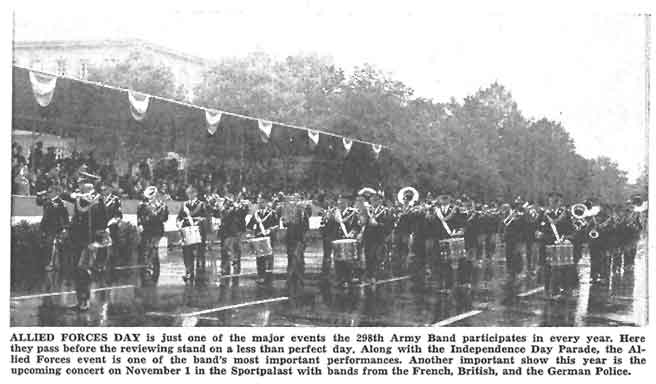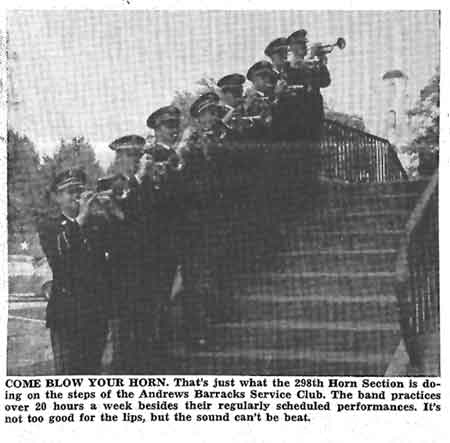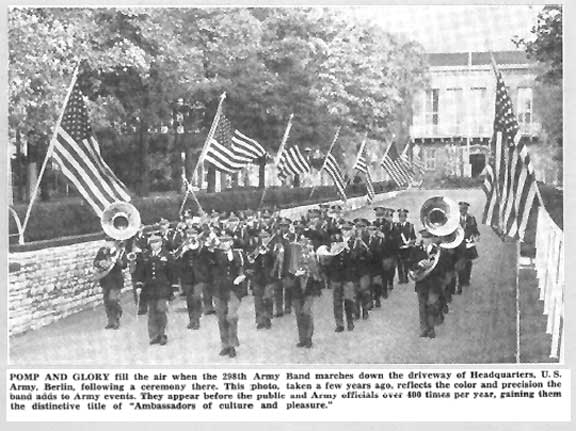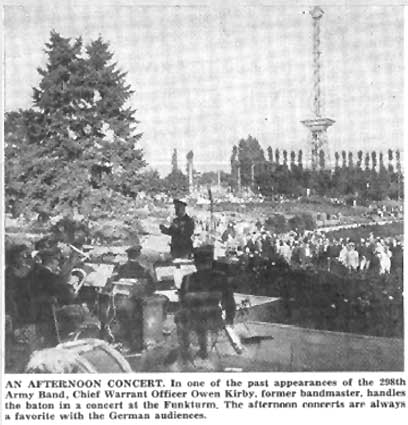298th Band - Ambassadors of Culture and Enjoyment
|

|
Less than a week after the first U. S. Army units occupied the American sector of post-war Berlin, the 298th Army Band arrived from England to assume its duties as the official band of the Army’s garrison in the four-power city.
Today, the 298th Army Band, also called the Berlin Brigade Band, serves as America’s instrument of culture-and pleasure-more than 100 miles behind the Iron Curtain. Musical organizations have served
a distinctive purpose in the Army since 1775. From the fife and drum
corps of revolutionary war days to the modern Army bands of today,
these specialized units have been used as potent contributors to high
troop morale and esprit de corps.
|

|
But here in Berlin, with its unique politico-military situation, the
298th Army Band, under the direction of Chief Warrant Officer-4
Howard W. Vivian, has another important mission. It serves as Berlin
Brigade’s prime unit in building German-American relations. And its
success is measured in part by the fact that the brigade enjoys one of
the warmest local community relations of any command in the Army.
To achieve that end the band plays an extensive concert schedule,
and West Berliners have had frequent opportunities to see and hear
it perform through the years. Among the annual events in which the band participates are the Allied Forces Day Parade, the West Berlin Police Show, the American community’s Berlin Easter Sunrise Service, the Independence Day Parade, the extensive Berlin district Friendship Days, the Berlin Airlift Memorial ceremony at Tempelhof Central Airport, summer concerts, and the Christmas tree lighting ceremony at the U. S. Headquarters, Berlin. All of these events-as well as many others-are open to the public and are always well received. One of the best-known of all the programs in which the band participates is the annual German-American Volksfest. The musicians’ rigorous Volksfest schedule of nearly 60 commitments includes playing for opening and closing ceremonies, concerts, and supporting various musical activities staged by other elements
in the command. At this year’s Volksfest, the band provided the music for “Hollywood’s Golden Years,” a musical revue depicting the history of Hollywood filmmaking. The schedule involved two performances nightly for 17 days, not including the other Volksfest commitments and command activities.
|

|
The band’s history is an interesting one. Coming overseas as a unit, the original band was attached to General Dwight D. Eisenhower’s headquarters in England. Then numbering 52 pieces, they played at all ceremonies and gave many concerts. Later, the band was attached to the, First Airborne Army. It remained in England until June 8, 1945, when it departed for duty in Berlin. The band played a concert upon arriving before an audience which included President Truman, General Eisenhower, General Omar Bradley and General George Patton. The occasion was the official flag-raising ceremony at the U. S. Group Control Center.
Unlike other U. S. Army bands in Europe, the 298th Army Band rarely
leaves its adopted city. During 24 years in Berlin, it has played for the
arrival of numerous dignitaries-both military and civilian-and at count-
less ceremonies and formations. On April 3, 1947, the band played for General Lucius D. Clay when he arrived here to become High Commissioner in Berlin. The unit again welcomed him when he returned as the late President Kennedy’s special representative on September 19, 1961. The 298th band also played for the arrival of Queen Elizabeth at Berlin’s Gatow Airport in 1965, and at the first British “Tattoo” in Berlin. For the latter performance they were assisted by a Berlin-based British Army Band.
|

|
In the immediate future the band has several important engagements.
On October 10 they will depart Berlin for a tour of the Federal Republic of Germany in the Hildesheim vicinity, and on November 1 they will play at the Sportpalast in a combined concert with the British, French, and German Police Band.
In addition to the entire band’s many commitments-usually over 400 per year-it contains several smaller units which have proven popular with both Germans and Americans.
Small jazz and pop combos are occasionally formed, such as “the
Salts and Pepper,” for dances and listening enjoyment, and they are always in demand for smaller gatherings.
One of the most popular groups is “The Ambassadors,” the band’s 16-piece dance band. It usually consists of five saxophones, four trumpets, three trombones, piano, bass, drums and selected soloists. The dance band also plays concerts, but serves mainly where stage space is limited or where the need is for a smaller group.
The full 298th Army Band now has 43 men: 5 trombones, 8 clarinets,
8 trumpets, 6 saxophones, 2 flutes, 4 french horns, 2 basses, 2 ‘baritones,1 piano, 4 percussion and 1 bassoon.
With their home at Andrews Barracks and their workplace anywhere
in West Berlin, these 43 men continue to compose one of the most popular units in all of the United States Army in Berlin.
|
|